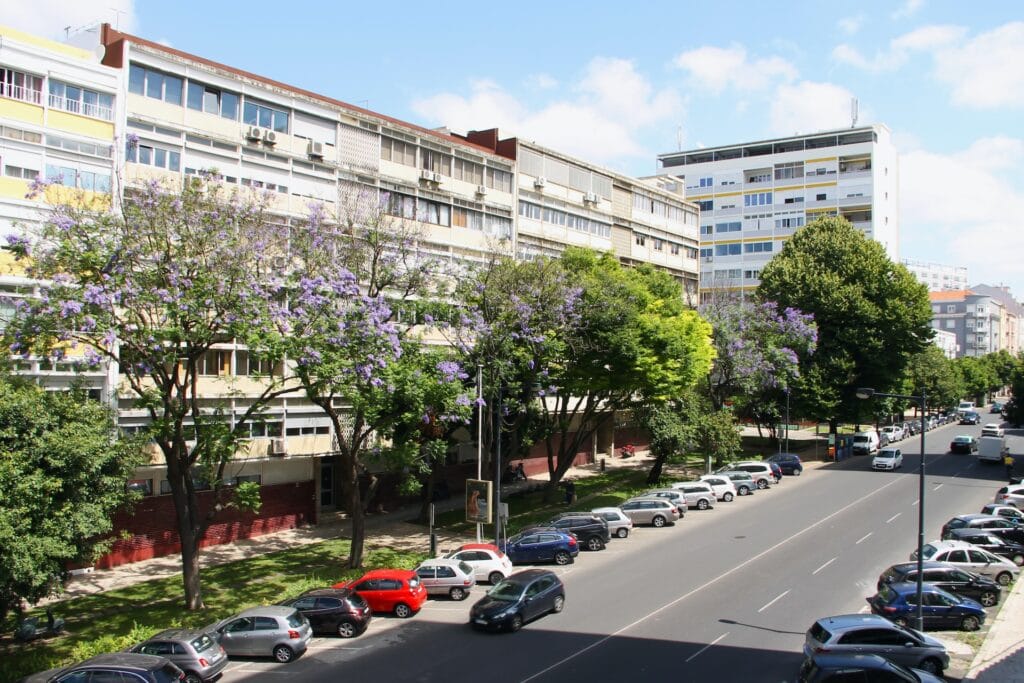Understanding how mortgages work in Portugal is important when you plan to buy a home. A mortgage in Portugal is a loan that a bank provides to help you purchase property. You agree to pay back this loan in monthly installments. The payment amount depends on the loan amount, interest rate, and repayment period. Different types of mortgages exist in Portugal. You can choose from fixed-rate, variable-rate and mixed-rate mortgages.
Let’s start with the different types of mortgages you can take in Portugal and what will be the interest rates.
Types of Mortgages with Interest Rates in Portugal
When you decide to buy a property in Portugal, understanding the different types of mortgages and their interest rates is important. Each mortgage type has unique features that can affect your long-term financial plans. Knowing these options will help you make a well-informed choice that suits your needs.
Fixed-Rate Mortgages
Fixed-rate mortgages in Portugal offer stability by keeping the interest rate the same throughout the entire loan period. This means your monthly payments will not change, making it easier for you to manage your budget. You know exactly how much you need to pay every month, so you can plan your finances without worrying about fluctuating rates.
Fixed-rate mortgages are a good option for those who prefer predictability in their payments. While the rate remains constant, it usually starts at a higher level compared to variable-rate mortgages. This is because the lender assumes more risk by guaranteeing a stable rate, even if market rates rise over time. If you plan to stay in your home for many years or if you expect interest rates to increase, a fixed-rate mortgage might be the best choice.
In Portugal, the typical loan term for fixed-rate mortgages ranges from 10 to 30 years. Some banks may offer flexible terms to match your financial situation. Even though the initial rate may seem higher, the peace of mind that comes with stable payments can outweigh the extra cost. Understanding these points helps you decide if a fixed-rate mortgage aligns with your financial goals.
Variable-Rate Mortgages
Variable-rate mortgages in Portugal have interest rates that can change during the loan term. These rates depend on the Euribor index, a standard rate that banks in Europe use to set their interest rates. When the Euribor rate goes up, your mortgage payments will also rise. If it goes down, your payments will decrease.
This type of mortgage can be more attractive if you want to start with lower monthly payments. Many borrowers choose variable-rate mortgages when they expect interest rates to stay low or even drop further. However, this option comes with some level of risk. If the market rates increase, your monthly payments could become much higher, affecting your overall budget.
Variable-rate mortgages often have a shorter initial rate period compared to fixed-rate loans. Some lenders may offer initial discounts on these rates to make them more appealing. These rates usually reset every six to twelve months based on the market conditions. If you feel comfortable taking on the risk of changing payments, a variable-rate mortgage can be a suitable choice.
Mixed-Rate Mortgages
Mixed-rate mortgages combine the features of both fixed and variable-rate mortgages. They start with a fixed interest rate for a set period, often between two to five years. After this fixed period ends, the mortgage shifts to a variable rate, which fluctuates with the market conditions.
This type of mortgage gives you the best of both worlds. You enjoy stable payments during the initial years, which can help you settle into your financial routine. Once the fixed-rate period ends, you may benefit from lower rates if the Euribor index remains favorable. Mixed-rate mortgages can be a great option if you plan to sell or refinance your property before the fixed-rate period ends.
Many people choose mixed-rate mortgages when they want some security at the beginning of their loan term but are open to taking on more risk later. It allows you to lock in a stable rate during the early years while still keeping the possibility of enjoying lower rates in the future. Understanding this mortgage type helps you make a balanced decision that fits your financial situation.

Interest Rates in Portugal
Interest rates for mortgages in Portugal vary depending on the type of mortgage, the amount you borrow, and your financial profile. Fixed-rate mortgages generally have higher rates because they offer stability throughout the loan term. The certainty they provide often leads banks to charge a premium for this security.
Variable-rate mortgages usually start with lower interest rates compared to fixed-rate ones. However, these rates can change based on the Euribor index. If the Euribor rate rises, your monthly payments will also increase. This variability makes these mortgages more attractive to those who can handle the possibility of fluctuating payments.
Mixed-rate mortgages often have a fixed rate for the initial period, followed by a variable rate. The initial fixed rate may be slightly higher than variable rates but lower than standard fixed-rate mortgages. This type of mortgage provides a balanced approach, offering stability at the start with the flexibility of lower rates in the future.
Eligibility Criteria for a Mortgage in Portugal
Understanding the eligibility criteria for a mortgage in Portugal can help you prepare better before applying. Banks in Portugal carefully review your financial profile to decide if you qualify for a mortgage. They consider your income, employment status, credit history, and existing debts. A stable and regular income plays a key role in increasing your chances of getting a mortgage in Portugal.
Application
Most banks expect applicants to have a steady job or a consistent source of income for mortgage requirements in Portugal. If you are self-employed, they may ask for more detailed financial documents like tax returns and bank statements to confirm your income stability. Good credit history also helps your case. Banks look for a strong record of repaying past loans or credit cards without delays. Poor credit history can lower your chances of approval or result in higher interest rates.
Age
Age also matters when you apply for mortgage requirements in Portugal. Most banks prefer applicants aged between 21 and 70 years old. The loan term usually ends before the borrower turns 75. This means if you apply at the age of 60, you might only get a 15-year loan term. The bank sets these age limits to ensure the borrower can repay the loan before reaching a point where income might reduce due to retirement.
Banks Issues
Banks also check your debt-to-income ratio to decide how much they can lend you. They usually prefer that your monthly mortgage payments do not exceed 30-40% of your monthly income. This mortgage requirements in Portugal rule helps ensure that you can afford the mortgage payments without putting too much strain on your budget. If your debt-to-income ratio is high, the bank might offer a lower loan amount or ask for a higher interest rate.
Non residents
Non-residents can still get a mortgage in Portugal, but they face stricter conditions compared to residents. Banks often require non-residents to make a higher down payment, usually between 30% to 40% of the property’s value. This extra requirement helps reduce the risk for the bank. Non-residents might also need to provide additional documents, like proof of foreign income and tax details from their home country.

Documents Required for a Mortgage Application
When you apply for a mortgage in Portugal, banks require specific documents to review your financial standing. Preparing these documents in advance helps speed up the Portugal mortgage process. Here is a list of all the essential documents you need to provide:
Identification Documents
- Valid passport or national ID card.
- Portuguese tax identification number (NIF).
Proof of Income
- Latest three months’ payslips if you are employed.
- Employment contract or a letter from your employer confirming your job details.
- Bank statements from the last six months showing your salary deposits.
Self-Employed or Business Owners
- Last two years of income tax returns.
- Financial statements of your business.
- Bank statements showing business transactions.
Proof of Address
- Recent utility bill (electricity, water, or gas) with your current address.
- Rental agreement or property ownership document.
Credit History
- Statement of any existing loans, credit cards, or debts.
- Credit report from your home country if you are a non-resident.
Property Information
- Purchase agreement or sales contract for the property.
- Property valuation report (sometimes arranged by the bank).
Bank Account Information
- Portuguese bank account details (most banks require you to open a local account).
- Recent bank statements from your accounts in Portugal.
Non-Resident Documents
- Proof of income in your home country.
- Tax return documents from your country of residence.
- Additional identification documents, like a residency certificate if applicable.
Insurance Documents
- Life insurance policy details (some banks may require you to get life insurance).
- Property insurance document showing coverage for the home.
Complete and accurate paperwork helps banks assess your application faster. Keep copies of all documents for your records in case the bank asks for more details later. Being well-prepared with these documents improves your chances of a smooth mortgage application process in Portugal.

Steps to Apply for a Mortgage in Portugal
Applying for a mortgage in Portugal becomes easier when you follow a structured approach. Here are six key steps to guide you through the mortgage requirements in Portugal.
1. Research and Compare Mortgage Options
Start by researching different mortgage options from banks in Portugal. Look into the types of mortgages, interest rates, repayment terms, and any special conditions. Fixed-rate, variable-rate, and mixed-rate mortgages offer different benefits, so choose based on your financial needs. Comparing these details helps you find the most suitable mortgage option that matches your budget and future plans.
2. Prepare Your Financial Documents
Gather all necessary documents before approaching the bank. Collect your identification documents, proof of income, employment details, and bank statements. Self-employed individuals should prepare tax returns and business financial statements. Banks also ask for a credit history check to assess your financial reliability. Having these documents ready speeds up the application process and reduces delays.
3. Calculate Your Budget and Down Payment
Assess how much you can afford to pay as a down payment on the property. Most banks in Portugal expect a down payment ranging from 20% to 40% of the property value. Calculate your monthly budget for mortgage repayments based on your income and other financial commitments. Knowing your budget for mortgage in Portugal helps you choose a loan amount that fits your financial situation without causing stress.
4. Submit Your Mortgage Application
Visit the bank with your prepared documents and fill out the mortgage application form. Provide accurate information and attach all required documents to avoid any delays. The bank will review your application, check your creditworthiness, and assess your eligibility. This step is important as it determines if you qualify for the loan and what terms the bank will offer you.
5. Review the Mortgage Offer
If the bank approves your application, they will send you a formal mortgage offer. Take your time to review the offer carefully. Check the interest rate, repayment schedule, any additional fees, and other terms. Make sure you understand all the conditions before accepting the offer. Clarify any doubts with the bank to avoid surprises later.
6. Sign the Mortgage Agreement and Transfer Funds
Once you agree to the mortgage terms, you will sign the mortgage contract in front of a notary. This legal step ensures that both you and the bank are committed to the agreement. After signing, the bank will transfer the loan amount directly to the property seller. Your mortgage repayments will begin as outlined in the agreement, and you officially become the owner of your new property.

How to Choose the Right Mortgage in Portugal
Choosing the right mortgage in Portugal requires careful comparison of your options. Interest rates play a big role in your decision. Fixed rates offer stability but might cost more in the long run. Variable rates can be cheaper at first, but they come with the risk of increasing over time.
You should also consider the loan term. A shorter loan term means higher monthly payments but less interest paid overall. A longer term gives you lower monthly payments but increases the interest you pay in the end. Weigh the pros and cons based on your financial situation.
Look at other conditions the bank sets for the mortgage. Some banks might ask you to open a bank account or take out insurance. Reading the terms carefully helps you avoid hidden fees. Compare all these factors to pick the mortgage in Portugal that best suits your needs.
Problems When Getting a Mortgage in Portugal
Applying for a mortgage in Portugal comes with its share of challenges. One common issue is meeting the income criteria set by banks for Portugal mortgage process. If your income does not meet their standards, the bank may reject your application. Improving your financial profile can help you overcome this challenge.
Another problem is dealing with fluctuating interest rates if you choose a variable mortgage. Rates can rise unexpectedly, increasing your monthly payments. Being prepared for this change helps you manage your finances better. Non-residents often face stricter requirements, like a higher down payment and more paperwork.
Language barriers can also cause misunderstandings during the mortgage process. Hiring a local advisor can make communication with the bank easier. By knowing these challenges, you can prepare better when applying for a mortgage in Portugal.
Tips for a Successful Mortgage Application
Getting approval for a mortgage in Portugal can become easier with the right approach. First, make sure your credit history looks good. Clear any outstanding debts before you apply for a mortgage. Banks prefer applicants with a clean financial record.
Save enough for a higher down payment. A bigger down payment increases your chances of mortgage approval. It shows the bank that you are serious about buying the property. Make sure you have all the necessary documents ready before submitting your application. Complete paperwork speeds up the process and avoids delays.
Choose the right time to apply. Banks in Portugal might offer better rates at specific times of the year. Keep an eye on the market trends. Finally, seek help from professionals like Portugal Investment Properties if you feel unsure. Professional advice can guide you through the process of how to get a mortgage in Portugal.

Find Your Perfect Property with us
Portugal Investment Properties is your gateway to smart real estate investments in Portugal, offering savvy investors access to an exclusive collection of carefully curated properties.
Whether you’re searching for your dream home or a prime investment opportunity in Portugal’s prestigious market, we provide more than just listings – experience a personalized journey tailored to your aspirations.
Begin your journey to discover your perfect Portuguese retreat. Contact us today!
Looking to Invest in Portugal?
Explore our newest listings below!
Frequently Asked Questions About How to Get a Mortgage in Portugal
What are the mortgage requirements in Portugal?
Banks check your income, employment status, credit history, and debts. They usually expect your monthly mortgage payments not to exceed 30-40% of your income.
How can I get a mortgage in Portugal as a non-resident?
Non-residents can still get a mortgage in Portugal. They often need a higher down payment of around 30-40% of the property’s value and must meet all other mortgage requirements in Portugal.
What is the typical interest rate for a mortgage in Portugal?
Interest rates for a mortgage in Portugal depend on the type of loan. Fixed-rate mortgages have steady rates, while variable-rate mortgages change with the Euribor index.
What documents do I need for the Portugal mortgage process?
You will need identification, proof of income, employment details, bank statements, and a credit history report. Self-employed individuals may need to provide tax returns and financial statements.
How long does the Portugal mortgage process take?
The mortgage process in Portugal can take anywhere from a few weeks to several months. It depends on how quickly you gather documents and how the bank reviews your application.
What down payment do banks require for a mortgage in Portugal?
Most banks expect a down payment of 20-40% of the property’s value. Non-residents might need to pay closer to the 40% mark as part of the mortgage requirements in Portugal.
Can I get a mortgage in Portugal if I have bad credit?
Bad credit can make it harder to get a mortgage in Portugal. Banks prefer applicants with a clean credit history and may offer higher interest rates to those with poor credit.
How to get a mortgage in Portugal with a low-income job?
You need to show that your income can cover the monthly payments. Some banks might require a higher down payment or a shorter loan term if you have lower income.
Do I need a Portuguese bank account for the mortgage process?
Yes, banks usually require you to open a Portuguese bank account. This account helps with the transfer of funds and the monthly mortgage payments in Portugal.
What happens if I miss a mortgage payment in Portugal?
Missing a mortgage payment can lead to penalties and affect your credit score. Contact your bank immediately if you face difficulties to avoid serious consequences.